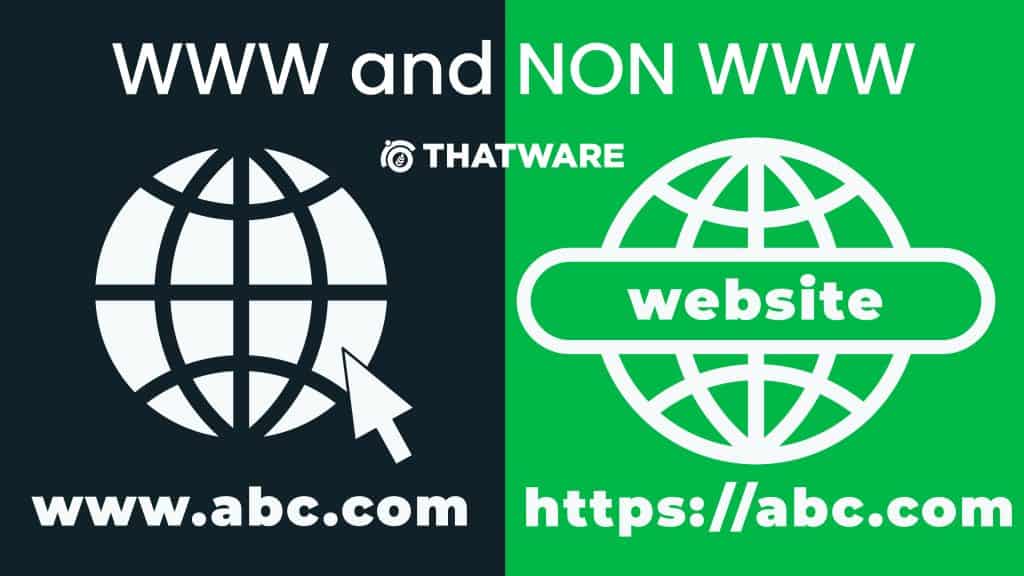SUPERCHARGE YOUR ONLINE VISIBILITY! CONTACT US AND LET’S ACHIEVE EXCELLENCE TOGETHER!
There is a myth in SEO regarding choosing www and non www protocols for your site. Before we start implementing for an average user and small business owner, there is categorically no variance between www vs non www. It’s completely a personal preference no matter what you choose for your domain.

There is only one main technical difference between these two types of URLs and Google doesn’t have a preference for one or the other.
Before we get into what that www and non-www difference is, here’s how the URL will look to the user:
URLs with www:
https://www.businessname.com
http://www. businessname.com
URLs without www:
https:// businessname.com
http:// businessname.com
SEO Benefits of www and non-www:
When it comes to the question of SEO benefits there is no special theory behind this. What’s important is that you stay consistent with the one that you chose at the time of starting your website. In other words, do not change your site URL to add or remove www from it.
Technical Difference between WWW vs non-WWW
When you add www. in front of a site, it acts as a hostname which can help with flexibility with DNS, the ability to restrict cookies when using multiple subdomains, and more. Whereas non-WWW domains also referred to as naked domains do not have a technical advantage.
Pros and Cons
Now that we’ve outlined some of the minor differences between the two URLs, let’s discuss the pros and cons of both.
WWW URL Pros
- Convenient for searchers to type the domain with www because all websites began with www at one point.
- www URL allows you to set cookies for your specific www subdomain.
- Website with www may appear more authentic than non-www URLs.
WWW URL Cons
- Most users don’t type www anymore when searching the web.
- Since Google favors shorter URLs, the www prefix makes the URL much longer.
Non-WWW URL Pros
- With the non-www domain, you don’t have the option to restrict cookies just to the root domain.
- Non-www domains don’t have CNAME records, which means you cannot redirect traffic from one server to the other.
Non-WWW URL Cons
- It’s much easier and faster for the users to just type the domain in the search.
- With the domain name being four characters shorter, it may have an impact on the search engine’s loyalty.
Canonicalization
One of the most important concepts in search engine optimization is canonicalization, which is the process of determining which URL format is best for a webpage when there are many copies of the same content. Canonicalization is significant when deciding between www and non-www versions of a website.
Canonicalization, as it relates to www versus non-www URLs, is designating one version of the URL as the preferred or canonical version and considering the other version as a duplicate or alternate URL. By doing this, search engines can determine which version of the URL to index and show in search results, preventing duplicate content problems and guaranteeing accurate webpage indexing and ranking.
Think of a website, for instance, that contains URLs that are both www and non-www:
www.example.com
example.com
Search engines could perceive these URLs as different sites with the same or comparable content if canonicalization isn’t done correctly, which could result in duplicate content problems. This may lessen the website’s authority and cause search engines to become confused about which URL version to display first in search results.
Website owners can use canonical tags, which are HTML elements positioned in the head part of a webpage, to address this. Search engines are informed by the canonical tag—which designates the preferred version of the URL—that all URL variants should be combined and indexed under the canonical URL.
The canonical tag would be added to the non-www version of the URL (example.com), for example, to indicate that www.example.com is the canonical version if that is the preferred version. Better search engine ranks and more accurate indexing result from this consolidation of the SEO value of anchor text, inbound links, and other webpage-related ranking variables.
The canonical tag would be added to the non-www version of the URL (example.com), for example, to indicate that www.example.com is the canonical version if that is the preferred version. Better search engine ranks and more accurate indexing result from this consolidation of the SEO value of anchor text, inbound links, and other webpage-related ranking variables.
Website Structure and Navigation
Understanding how URL formatting impacts user experience and site administration is crucial when analyzing how selecting between www and non-www URLs affects the structure and navigation of websites.
- Uniformity in URL Structure: Selecting www or non-www URLs creates uniformity in the structure of the website. By referencing the same version of the URL throughout all internal links, navigation menus, and sitemaps, consistent URL formatting helps to avoid misunderstanding among users and search engines.
- Better User Experience: By offering logical and predictable navigation routes, a consistent URL structure improves user experience. The website’s URLs are simple for users to comprehend and remember, which makes it simpler for them to share links with others or go back to particular pages. This ease of use enhances the browsing experience, which raises interest and pleasure.
- Helps with Site Management: Keeping the URL format constant makes site maintenance and administration easier. Webmasters can quickly track and manage internal links, change navigation menus, and evaluate site performance with uniform URLs across the website, all without the hassle of managing different URL variants. This lowers the possibility of mistakes or discrepancies while streamlining administrative procedures.
- Improved SEO: Consistent URL layout can benefit search engine rankings from an SEO standpoint. Because they are simpler to scan and index, search engines prefer websites with logical and well-organized architectures. Websites may increase their relevance and exposure in search engine results by using a consistent structure for their URLs, whether they are www or not. This will eventually increase organic traffic.
- Navigation Optimization: User engagement and website navigation can also be impacted by the selection between www and non-www URLs. For instance, webmasters may design logical and user-friendly navigation menus that smoothly lead visitors through the site’s content by using consistent URL syntax. Websites may improve usability and stimulate exploration by lining up navigation elements with the selected URL format. This will increase client satisfaction and conversion.
HTTPS Implementation
Since HTTPS encryption has significant effects on security, search engine results, and user trust, both www and non-www versions of websites need to be used.
- Advantages of HTTPS for Security: HTTPS (Hypertext Transfer Protocol Secure) encrypts data while it is transferred between a user’s browser and the website server, guaranteeing that private information is kept secret and shielded from unauthorized access or alteration. For websites that handle sensitive data, including login passwords, credit card numbers, and personal information, this encryption is significant. Website owners can reduce the risk of data breaches and cyberattacks and protect user privacy by installing HTTPS.
- Effect on Search Engine Rankings: HTTPS has become a ranking element in search engine algorithms, especially Google’s, in addition to improving security. Websites that offer a secure browsing experience are given priority by search engines, which reward HTTPS-enabled sites with higher search result ranks. Website owners may increase their online presence and perhaps draw in more organic visitors by making the switch to HTTPS, which will increase their visibility and trustworthiness in search engine results pages (SERPs).
- User Trust and Confidence: In addition to safeguarding user data, HTTPS gives website visitors a sense of trust and confidence. Users are comforted that their connection to the website is encrypted and safe when they see the padlock icon and “Secure” label in the address bar of their browser. Users may interact with the website more freely as a result of this sense of security, revealing private information, completing forms, and making transactions. Additionally, HTTPS maintains the integrity and reputation of the website by preventing security alerts and browser warnings that might discourage visitors from visiting insecure websites.
- Consistency Across URL Variations: To ensure that consumers have a uniform and safe surfing experience, HTTPS must be implemented consistently across all versions of a website, regardless of whether it utilizes www or non-www URLs. This guarantees that users’ data is safeguarded and their faith in the website is maintained, irrespective of how they access it (via www or non-www URLs).
- Protecting Against Security Risks in the Future: HTTPS encryption continues to be a vital line of defense against illegal access and data breaches even as cyber threats change. Businesses may show their dedication to safeguarding user privacy and security by proactively deploying HTTPS for both www and non-www versions of their websites. This allows them to keep ahead of possible security problems.
Mobile-Friendly Considerations
Websites must now be optimized for mobile surfing to provide a satisfactory user experience and stay competitive in search engine results since a considerable amount of internet traffic now comes from mobile devices.
- Mobile-Friendly Design: Websites that are optimized for viewing and interacting on various mobile devices, such as tablets and smartphones, are said to be mobile-friendly. This calls for the use of responsive design strategies, which dynamically modify the website’s content and layout according to the device’s orientation and screen size. Websites that prioritize mobile-friendly design are better able to meet the needs and preferences of mobile users, which boosts user happiness and engagement.
- URL Formatting for Mobile Devices: The decision to use a www or non-www URL can affect how mobile-friendly a website is, especially in terms of readability and URL length on small displays. Because shorter URLs are easier to type and more straightforward, non-www versions of these URLs are typically more user-friendly on mobile devices. Users may become frustrated and give up trying to write lengthier URLs with the www prefix if they have limited screen real estate and keyboard input.
- Simplified Navigating: By making navigating easier and requiring less cognitive effort from users, non-www URLs enhance the mobile surfing experience. Shorter URLs make it simpler for consumers to read, remember, and share content, which makes it easier for mobile users to access certain website pages. This simplified navigation procedure promotes exploration and improves usability, which in turn increases engagement and conversions.
- Enhanced Page Load Speed: Because shorter URLs take less time to send and process, they can also help mobile devices load pages more quickly. Users who have slower internet connections or limited bandwidth, who could encounter delays while viewing websites with lengthy URLs, would especially benefit from this. Websites may provide a faster, more responsive browsing experience, lower bounce rates, and increase user retention by optimizing URL layout for mobile devices.
- SEO Considerations: Mobile friendliness is an important ranking criterion in search engine algorithms, especially for mobile search results, from an SEO standpoint. Mobile-friendly websites are given preference by search engines in their mobile search rankings, which benefits them by giving them more exposure and better placement in search results. Websites may increase their chances of ranking highly in mobile search, drawing more organic traffic, and optimizing their online presence by implementing non-www URLs and other mobile-friendly design techniques.
Key Differences Between WWW and Non-WWW
1. No SEO Difference
From an SEO perspective, there is no direct advantage to using either www or non-www. Search engines like Google treat both formats equally, provided they are configured correctly. The critical factor is consistency. Once you choose a preferred format, stick to it across your entire site to avoid duplicate content issues.
2. Technical Aspects
- WWW as a Hostname: Using www allows for better DNS and server configuration flexibility, including setting up CNAME records.
- Non-WWW (Naked Domain): This is simpler and looks cleaner but lacks the advanced DNS configuration capabilities.
Canonicalization is the process of indicating your preferred domain format to search engines. Use the rel=”canonical” tag to ensure search engines know which version to index. Without this, search engines might treat www and non-www as separate sites, diluting your SEO efforts.
3. Redirection Setup
Setting up a 301 redirect from one format to the other ensures visitors and search engines are always directed to the correct version of your website. This consolidation helps maintain link equity and prevents duplicate content penalties.
Pros and Cons of WWW and Non-WWW URLs
WWW URLs
Advantages:
- Technical Flexibility: Allows better DNS record management.
- Cookie Management: Can restrict cookies to the main domain, improving performance.
- Server Distribution: Ideal for scaling and using content delivery networks (CDNs).
Disadvantages:
- Longer URLs: Adds an extra three characters to the URL, potentially affecting user-friendliness.
Non-WWW URLs
Advantages:
- Cleaner Look: Shorter and more user-friendly.
- Memorability: Easier to type and remember for users.
Disadvantages:
- Limited Technical Flexibility: Lacks DNS record options like CNAME.
- Scalability Issues: May pose challenges when expanding a site with multiple subdomains.
SEO and User Experience Implications
1. Brand Consistency
A consistent domain format across all pages helps reinforce brand identity and avoid user confusion. When users see a uniform domain structure, they are more likely to recognize and trust the website. Inconsistent domain formats can cause confusion and even result in lost traffic. Maintaining uniform branding also helps in offline marketing efforts, as a recognizable URL is easier to recall.
Additionally, consistent branding extends beyond just the domain name. Ensure the site’s logo, color schemes, and page layout remain uniform across all versions. This cohesive presentation builds a professional image and fosters trust.
2. Indexing and Crawling
Search engines may encounter duplicate content if www and non-www versions are not consolidated. Proper redirects and canonical tags are essential to direct search engines toward the correct version. If both versions are accessible, search engines might index them separately, resulting in split ranking signals.
Use tools like Google Search Console to monitor how your site is indexed. Submit sitemaps with your preferred domain format and set your preferred domain in the Search Console settings. This ensures search engines understand which version you intend to rank.
Additionally, maintaining a clear URL structure improves crawl efficiency. Use robots.txt files to manage crawler access and avoid unnecessary duplicate content indexing.
3. Link Equity Preservation
Links from external websites can point to either version. Proper redirection ensures link equity is passed to the preferred domain. This consolidation boosts the website’s search engine rankings by centralizing link authority.
Monitor backlinks regularly using SEO tools like Ahrefs, Moz, or SEMrush. If valuable links point to the wrong version, consider reaching out to the referring sites and requesting updates. Simultaneously, ensure your internal linking structure consistently uses the preferred domain to avoid link dilution.
4. Trust and Credibility
Users may perceive www as more trustworthy due to its association with established websites. Historically, websites using www were considered more official and reliable. While this perception is fading, some users still find www domains more familiar and professional.
Moreover, incorporating SSL certificates (HTTPS) further enhances trust regardless of the domain format. A secure site with a recognizable domain reassures visitors, reducing bounce rates and increasing conversions.
5. User Experience and Navigation
A clear and consistent domain format improves user experience by ensuring seamless navigation. Visitors expect a smooth browsing experience, free from redirects and inconsistent URLs. A well-maintained domain format prevents 404 errors and broken links, keeping users engaged.
Consider implementing custom 404 pages to guide users back to the main site if they encounter navigation issues. This small effort can significantly reduce user frustration and keep traffic flowing.
6. Branding in Marketing Campaigns
Domain consistency is crucial for online and offline marketing campaigns. A memorable, branded URL makes promotional efforts more effective. Ensure the same domain format is used in email campaigns, social media, advertisements, and printed materials to maximize recall and visibility.
Track marketing performance using UTM parameters while ensuring consistent domain usage. This helps in accurately measuring campaign success and identifying traffic sources.
7. Cross-Browser Compatibility
Different browsers may interpret URLs differently if proper domain settings are not configured. Ensuring a consistent domain format across various browsers minimizes potential compatibility issues.
Test the website on popular browsers like Chrome, Firefox, Safari, and Edge. Use responsive design testing tools to verify that the site functions properly regardless of how users access it.
8. Future Scalability
Consistent domain usage supports scalability when launching new services or expanding internationally. A well-defined domain structure simplifies content management and future website upgrades.
As businesses grow, managing multilingual sites or adding subdomains becomes easier with a stable domain configuration. Use localized domains or subfolders to expand content while retaining a unified brand identity.
9. Technical SEO Best Practices
Implementing best practices such as schema markup, structured data, and rich snippets becomes easier when using a consistent domain format. These enhancements help search engines better understand your site’s content, improving search visibility.
Use SEO auditing tools to regularly check for domain inconsistencies, crawl errors, and indexing issues. Corrective measures can maintain high search rankings and a strong online presence.
10. Security and Data Integrity
A consistent domain setup strengthens security by reducing vulnerabilities from incorrect redirects and unprotected subdomains. SSL certificates should cover all domain versions to ensure data encryption and user safety.
Configure HTTP Strict Transport Security (HSTS) to force HTTPS on all pages. This minimizes the risk of data breaches and instills confidence in users, safeguarding your website’s reputation.
Security Considerations
1. HTTPS Implementation
- Implementing HTTPS is critical for both www and non-www versions.
- Ensure SSL certificates cover all versions of the domain.
2. Security Headers
- Add security headers to both versions to protect against common web vulnerabilities.
Mobile and User Experience Considerations
1. Shorter URLs for Mobile
Non-WWW URLs, being shorter, are often better for mobile browsing. Short URLs fit better in mobile browsers and social media previews.
2. Responsive Design Compatibility
Ensure your website is fully responsive, regardless of the chosen domain format.
Social Media and Sharing Considerations
- Brand Presentation: A shorter URL can look cleaner when shared on social media platforms.
- Link Previews: Proper meta tags and Open Graph settings ensure visually appealing previews, regardless of the URL format.
Analytics and Tracking
- Consistent Tracking IDs: Ensure Google Analytics, Google Search Console, and other tracking tools are set up with the preferred domain format.
- Avoid Duplicate Data: Incorrect setup can result in duplicate tracking data, skewing analytics reports.
Server and Hosting Considerations
- Server Configuration: Choose a hosting provider that supports easy configuration of preferred domain redirects.
- Performance Optimization: Use caching, CDNs, and other performance-boosting techniques to ensure fast load times.
How to Choose the Right Format for Your Website
- Business Needs: Evaluate your business goals, target audience, and technical requirements.
- Scalability Plans: Consider future growth, especially if subdomains or CDNs are planned.
- Technical Expertise: Choose a format that your development team can manage effectively.
Implementing the Right Format
- Set Up Redirects: Use 301 redirects from the non-preferred format to the preferred one.
- Use Canonical Tags: Add rel=”canonical” tags to pages.
- Update Backlinks: Reach out to major link sources to update any incorrect backlinks.
- Configure Search Console: Set the preferred domain in Google Search Console.
Wrapping Up
We can conclude by telling that shorter URLs of your website tend to perform well in the search engine, so keep in mind to implement this.

Thatware | Founder & CEO
Tuhin is recognized across the globe for his vision to revolutionize digital transformation industry with the help of cutting-edge technology. He won bronze for India at the Stevie Awards USA as well as winning the India Business Awards, India Technology Award, Top 100 influential tech leaders from Analytics Insights, Clutch Global Front runner in digital marketing, founder of the fastest growing company in Asia by The CEO Magazine and is a TEDx speaker and BrightonSEO speaker.


